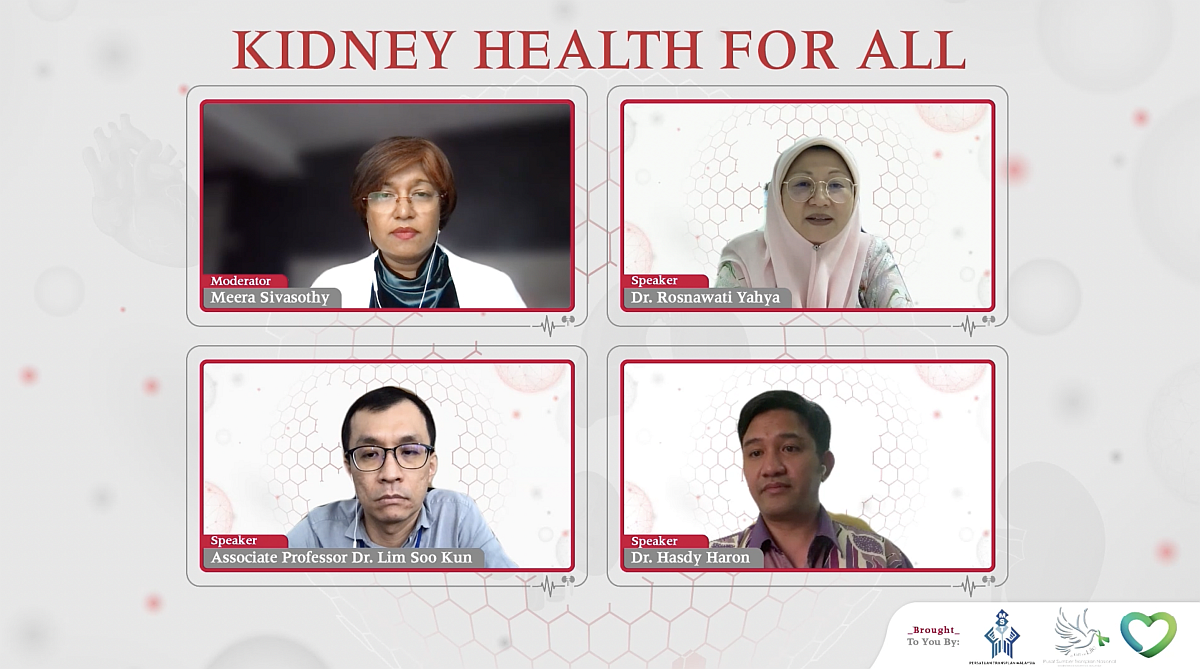KUALA LUMPUR, March 31 – In conjunction with World Kidney Day 2022, Astellas Pharma, a leading global pharmaceutical company, has organised a media forum with the theme of “Bridge The Knowledge Gap To Better Kidney Care”.
The event covered topics such as the prevalence and causes of chronic kidney disease (CKD) in Malaysia, treatment options for this non-communicable disease, including organ transplantation, and the challenges faced by CKD patients and their caregivers.
The medical experts who shared their knowledge during the forum were Dr Rosnawati Yahya, consultant nephrologist and head of the Transplantation Unit, Department of Nephrology, Hospital Kuala Lumpur and President of the Malaysian Society of Transplantation, Dr Lim Soo Kun, consultant nephrologist and head of the Renal Division, Department of Medicine, University of Malaya, and Dr Hasdy Haron, Senior Clinical Organ Donation Manager, National Transplant Resource Centre
CKD is a significant public health issue in Malaysia, due to the increasing number of cases over the years, combined with low awareness of the disease, which could lead to late diagnosis and more severe complications.
“CKD is more prevalent in Malaysia mainly due to the high rates of diabetes, hypertension and obesity in our population. Based on the 2018 National Health and Morbidity Survey (NHMS), CKD affects about 15.5 per cent of the country’s population, or roughly one in six Malaysians. The survey also revealed that the number of End-Stage Kidney Disease (ESKD) patients has risen over the past seven years,” said Dr Rosnawati.
Dr Lim shared that treatment options are recommended based on the patient’s needs and their current and future best interests. According to him, there are effective treatments for CKD, including CKD to ESKD.
While haemodialysis is the most common treatment for ESKD among Malaysians, Dr Lim noted that kidney transplantation is the optimal treatment for late-stage CKD patients, including those with ESKD, as it effectively offers a cure for the condition.
“CKD patients who undergo a kidney transplant will have a much better quality of life than those on dialysis. They will not need to be tied down to their dialysis schedule and their chances of living longer, with fewer health complications, are also much higher,” he said.
However, Dr Hasdy shared that the rate of organ donations in Malaysia is low, compared to other countries. As of 2018, only 1.3 per cent of the population had opted-in to become organ donors after their death.
In comparison, more than 22,000 patients in the country are in need of kidney transplants.
“Kidney transplants have been done in the country since 1975 when the first living kidney donation was performed in Hospital Kuala Lumpur. But the transplant rate in Malaysia is among the lowest, not only in the world, but in Asean countries as well. Looking at the prevalence of CKD in Malaysia, we must continue the effort to raise awareness for organ donations to help solve this scarcity,” he said.
He added that an organ donation is a noble act and its process follows strict procedures to ensure that both donor and patient are compatible and can undergo the procedure safely.
Kidney transplants are one of the procedures where the donor can be either living or brain-dead (also known as a cadaveric donor).
A living donor, who must be related to the patient and agree to donate their kidney voluntarily, can give their organ without detriment to their health, provided that they pass the necessary medical check-up beforehand.
After the transplant, the patient can go back to a normal lifestyle, although they will need to live healthily and take immunosuppressant medications for the rest of their life.
The aftercare for kidney transplant patients is far less than other CKD treatment options, as patients are only required to take immunosuppressants to ensure that their body does not reject the donated kidney.
Patients can resume a normal life shortly after the transplant, although they should maintain a healthy lifestyle and ensure that they go for their medical check-ups regularly.
World Kidney Day is an annual global campaign organised by the International Society of Nephrology (ISN) and the International Federation of Kidney Foundations-World Kidney Alliance (IFKF-WKA).
It is aimed at raising awareness of the importance of our kidneys and reducing the impact of kidney disease worldwide.
The theme for this year’s event is “Kidney Health for All”.








